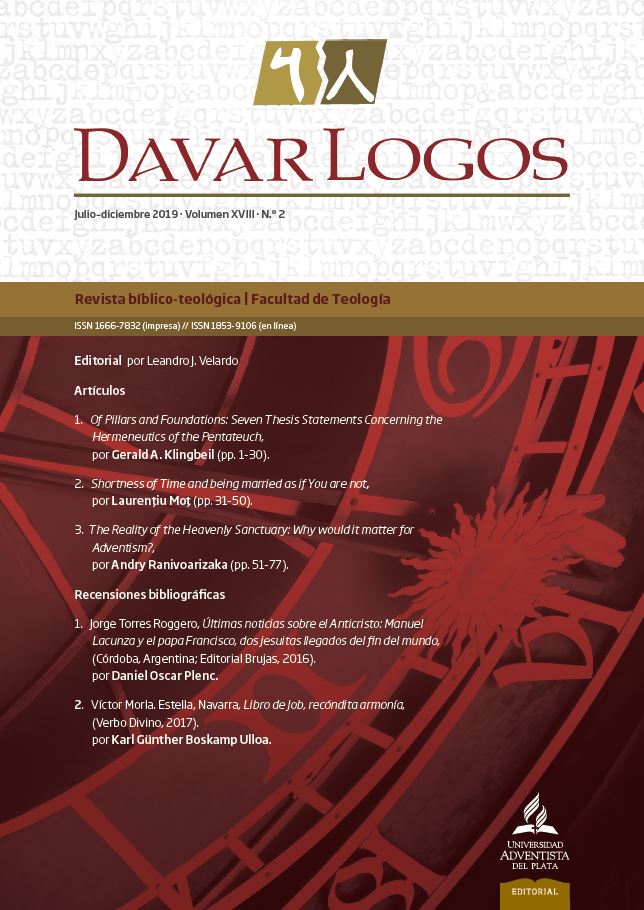La brevedad del tiempo y estar casado como si no se lo estuviera
Palabras clave:
Tiempo del fin, Matrimonio, Celibato, 1 Corintios 7Resumen
Este artículo aborda la pregunta de qué quiere decir Pablo en 1 Corintios 7,29 cuando declara que para el tiempo que queda, para los que tienen esposa, debe ser como si no la tuvieran. Esto se puede referir a un principio ético universal, eterno, o a uno limitado por el contexto —uno escatológico, en este caso—. El estudio procede a abordar la pregunta primaria del significado del versículo en tres secciones. La primera analiza lecturas de escritores cristianos primitivos. La segunda examina el lenguaje del texto y se concentra específicamente en el significado, la sintaxis y el aspecto verbal. En la sección tercera y final, el estudio considera el contexto social y filosófico que puede haber conformado las concepciones corintias del matrimonio. Una comparación entre distintos filósofos estoicos sugiere que Pablo procede con una ambivalencia similar sobre el matrimonio, pero es una que está marcada particularmente por la comprensión escatológica. Esto es ubicado una y otra vez sobre y contra el “trasfondo grecorromano del matrimonio”, que está caracterizado por obligaciones sociales y la expectativa de la relación sexual.
Descargas
Referencias
Clement of Alexandria states in his Paedagogus 2.3.36.1.3-2.1, Εἰ δὲ ἐπὶ γάμου ταῦτα, ἐφ’ οὗ φησιν
ὁ θεὸς »πληθύνεσθε», πῶς οἴεσθε τὴν ἀπειροκαλίαν ἐξ αὐθεντείας κυριακῆς ἐξοριστέαν; (“But if
these are said about marriage, of which God says ‘multiply’, how can you not think one must
expel the extravagance of the dominating woman?”). Clément d’Alexandrie, Le pédagogue, 3
vols., H.-I. Marrou, M. Harl, C. Mondésert, C. Matray, ed. (Paris: Cerf, 1960-1970).
Alexander Roberts, James Donaldson, and A. Cleveland Coxe, The Ante-Nicene Fathers Vol. IV:
Translations of the Writings of the Fathers Down to A.D. 325 (Oak Harbor: Logos Research Systems, 1997), 64.
See also Tertullian, On Modesty 16. He states that since this world is passing away, the command
in 1 Cor 7,29 is the opposite to “grow and multiply” from the beginning of the world. Roberts,
Donaldson, and Cleveland Coxe, The Ante-Nicene Fathers Vol. IV, 92.
Ibid., 53.
Ibid., 60.
Philip Schaff, The Nicene and Post-Nicene Fathers, Vol. VI (Oak Harbor: Logos Research Systems, 1997), 17. Augustine in Sermons on Selected Lessons of the New Testament 1.21 speaks
of the “union of hearts” between husband and wife, without any sexual intercourse: “21. Joseph
then was not the less His father, because he knew not the mother of our Lord, as though concupiscence and not conjugal affection constitutes the marriage bond. Attend, holy brethren;
Christ’s Apostle was some time after this to say in the Church, “It remaineth that they that
have wives be as though they had none”. And we know many of our brethren bringing forth
fruit through grace, who for the Name of Christ practise an entire restraint by mutual consent,
who yet suffer no restraint of true conjugal affection. Yea, the more the former is repressed, the
more is the other strengthened and confirmed. Are they then not married people who thus live,
not requiring from each other any carnal gratification, or exacting the satisfaction of any bodily
desire? And yet the wife is subject to the husband, because it is fitting that she should be, and so
much the more in subjection is she, in proportion to her greater chastity”. Schaff, The Nicene and
Post-Nicene Fathers Vol. VI, 252-253
Schaff, The Nicene and Post-Nicene Fathers, 10:49.
Roberts, Donaldson, and Cleveland Coxe, The Ante-Nicene Fathers Vol. VI, 322.
Ibid., 346-347.
Gerald Lewis Bray, 1-2 Corinthians, Ancient Christian Commentary on Scripture NT 7
(Downers Grove, IL: InterVarsity Press, 1999), 70.
Ibid.
Roberts, Donaldson, and Cleveland Coxe, The Ante-Nicene Fathers Vol. IV, 53.
Roberts, Donaldson, and Cleveland Coxe, The Ante-Nicene Fathers Vol. IV, 42.
Schaff, The Nicene and Post-Nicene Fathers, 3:445.
Eusebius in Demonstration evanghelica 1.9.5.1-6.2, τοῖς μὲν παλαιοῖς ἀνειμένον καὶ ἐλεύθερον
μετιοῦσι βίον οὐδὲν ἦν ἐμποδὼν οἴκου καὶ παίδων προΐστασθαι μετὰ τῆς περὶ τὸ θεῖον σχολῆς,
αὐταῖς γαμεταῖς καὶ παισὶ καὶ οἴκοις θεοσεβεῖν ἀπερισπάστως δυναμένοις, καὶ μηδαμῶς ὑπὸ τῶν
ἐκτὸς τῆς περὶ τὰ κρείττω προθέσεως ἀποσπωμένοις· τὰ δὲ καθ’ ἡμᾶς μυρία τὰ ἐκτὸς καθέλκοντα
καὶ εἰς ἀλλοκότους φροντίδας περισύροντα τῆς τε περὶ τὰ θεῷ ἀρεστὰ σπουδῆς ἀφιστάντα τυγχάνει.
τοῦτο γοῦν αἴτιον εἶναι τῆς τῶν γάμων συστολῆς παρίστησιν ὁ τῆς εὐαγγελικῆς διδασκαλίας λόγος,
φάσκων, “The men of old days lived an easier and a freer life, and their care of home and family
did not compete with their leisure for religion; they were able to worship God without distraction from their wives and children and domestic cares, and were in no way drawn by external
things from the things that mattered most. But in our days there are many external interests
that draw us away, and involve us in uncongenial thoughts, and seduce us from our zeal for the
things which please God. The word of the Gospel teaching certainly gives this as the cause of
the limitation of marriage”. Eusebius of Caesarea, The Proof of the Gospel Being the Demonstratio
Evanghelica, trans. W. J. Farrar (London, Macmillan, 1920), 51. Italics mine.
Roberts, Donaldson, and Cleveland Coxe, The Ante-Nicene Fathers Vol. III, 294.
Philip Schaff and Henry Wace, eds., The Nicene and Post-Nicene Fathers Second Series, vol. VIII
(Oak Harbor: Logos Research Systems, 1997), 214.
Roberts, Donaldson, and Cleveland Coxe, The Ante-Nicene Fathers Vol. V, 536.
Schaff, The Nicene and Post-Nicene Fathers Vol. V, 270.
Schaff, The Nicene and Post-Nicene Fathers Vol. V, 270. Augustine in Sermons on Selected Lessons
of the New Testament 75.7 quotes 1 Cor 7,29 in the context of holding possessions and he clearly
distinguishes between being a lord over and slave, subject to one’s own possessions. Schaff, The
Nicene and Post-Nicene Fathers Vol. VI, 479.
Bray, 1-2 Corinthians, 70.
Martin Luther, vol. 28, Luther’s Works, vol. 28: 1 Corinthians 7, 1 Corinthians 15, Lectures on 1
Timothy, eds., Jaroslav Jan Pelikan, Hilton C. Oswald and Helmut T. Lehmann, Luther’s Works
(Saint Louis: Concordia Publishing House, 1999), 1 Co 7:31.
John Calvin, Calvin’s Commentaries: 1 Corinthians, electronic ed., Logos Library System; Calvin’s Commentaries (Albany, OR: Ages Software, 1998), 1 Cor 7:29.
Timothy Friberg, Barbara Friberg and Neva F. Miller, vol. 4, Analytical Lexicon of the Greek New
Testament, Baker’s Greek New Testament Library (Grand Rapids, MI: Baker Books, 2000),
; Gerhard Delling, “Καιρός”, Theological Dictionary of the New Testament, vol. 3, ed. Gerhard
Kittel, Geoffrey W. Bromiley, and Gerhard Friedrich (Grand Rapids, MI: Eerdmans, 1964-),
; James Hope Moulton and George Milligan, The Vocabulary of the Greek Testament (London: Hodder and Stoughton, 1930), 315.
William Arndt, Frederick W. Danker and Walter Bauer, A Greek-English Lexicon of the New
Testament and Other Early Christian Literature, 3rd ed. (Chicago, IL: University of Chicago
Press, 2000), 498; Horst Robert Balz and Gerhard Schneider, Exegetical Dictionary of the New
Testament, 3 vols. (Grand Rapids, MI: Eerdmans, 1990-1993), 2:233. As Gordon Fee puts it,
“more likely the noun ‘time’ refers to the eschatological event of salvation, which has been set in
motion by Christ’s death and resurrection and the gift of the Spirit”. Gordon D. Fee, The First
Epistle to the Corinthians, NICNT (Grand Rapids, MI: Eerdmans, 1987), 338-339.
R. A. Kraft, ed., Ép tre de Barnabé (Paris: Cerf, 1971), 72-218.
The idea of the eschatological times being shortened is also present in Matt 24:22.
“Hear my words, O my people; prepare for battle, and in the midst of the calamities be like
strangers on the earth. 41 Let the one who sells be like one who will flee; let the one who buys
be like one who will lose; 42 let the one who does business be like one who will not make a
profit; and let the one who builds a house be like one who will not live in it; 43 let the one who
sows be like one who will not reap; so also the one who prunes the vines, like one who will not
gather the grapes; 44 those who marry, like those who will have no children; and those who do
not marry, like those who are widowed. 45 Because of this, those who labor, labor in vain; 46 for
strangers shall gather their fruits, and plunder their goods, overthrow their houses, and take
their children captive; for in captivity and famine they will produce their children. 47 Those who
conduct business, do so only to have it plundered; the more they adorn their cities, their houses
and possessions, and their persons, 48 the more angry I will be with them for their sins, says the
Lord” (NRSV).
Archibald Robertson and Alfred Plummer, A Critical and Exegetical Commentary on the First
Epistle of St. Paul to the Corinthians (New York, NY: C. Scribner’s Sons, 1911), 155.
James Hope Moulton, A Grammar of New Testament Greek, Volume 1: Prolegomena (Edinburgh: T. & T. Clark, 2006), 178. Stanley Porter seems to ascribe a resultative meaning of ἵνα
in 1 Cor 7,29, “the time stands shortened, with the result that those having wives might be
as those not having [wives]”. Stanley E. Porter, Idioms of the Greek New Testament (Sheffield:
JSOT, 1999), 235.
Buist M. Fanning, Verbal Aspect in New Testament Greek (Oxford: Clarendon Press, 1990),
-418.
Daniel B. Wallace, Greek Grammar Beyond the Basics: Exegetical Syntax of the New Testament
(Grand Rapids, MI: Zondervan, 1996), 620.
“The use of the participle echontes with and without the article indicates a distinction, not between two groups of persons, but between the actual situation of the persons and the way they
are to treat their situation”. William F. Orr and James Arthur Walther, I Corinthians: A New
Translation, Introduction, With a Study of the Life of Paul, Notes, and Commentary (New Haven,
CT: Yale University Press, 2008), 219.
Fanning prefers the word “customary” (see Fanning, Verbal Aspect, 410).
For this use of the subjunctive, see C. F. D. Moule, An Idiom Book of the New Testament Greek,
nd ed. (Cambridge: Cambridge University Press, 1959), 22. See also Wallace, Greek Grammar
Beyond the Basics, 464.
“Paul is not battling a realized eschatology in Corinth, but pressing his own eschatological orientation on those who do not think in the same way. The climactic events of history are already
underway; their completion is imminent. Since the institutionalized ‘form’ of society as we
know it is ‘passing away’ (v. 31b; cf. Rom 8:18-25), the appropriate stance toward the world is ‘as
though . . . [not]’”. Richard A. Horsley, 1 Corinthians, Abingdon New Testament Commentary
(Nashville, TN: Abingdon Press, 1998), 106.
David E. Garland, 1 Corinthians, BECNT (Grand Rapids, MI: Baker Academic, 2003), 329-30.
See also Richard Pratt: “Paul’s words should not be taken in an absolute sense. Elsewhere he
affirmed balanced views of marriage responsibilities and sexuality (Eph. 5:22–33), happiness
(1 Thess. 5:16), mourning (Phil. 3:18), and possessions (1 Tim. 6:8). In this passage, he reminded all Corinthians that these legitimate aspects of life are not everything”. Richard L. Pratt,
Jr, I & II Corinthians, Holman New Testament Commentary 7 (Nashville, TN: Broadman &
Holman Publishers, 2000), 121.
As Richard Hays puts it, “he means that they should live out their marriages with a watchful
awareness that the present order of things is not ultimate”. Richard B. Hays, First Corinthians,
Interpretation, a Bible Commentary for Teaching and Preaching (Louisville, KY: John Knox
Press, 1997), 127
Fanning, Verbal Aspect, 199-200.
John Peter Lange, Philip Schaff, Christian Friedrich Kling and Daniel W. Poor, A Commentary
on the Holy Scriptures: 1 Corinthians (Bellingham, WA: Logos Research Systems, 2008), 161.
Simon J. Kistemaker and William Hendriksen, vol. 18, New Testament Commentary: Exposition
of the First Epistle to the Corinthians, New Testament Commentary (Grand Rapids, MI: Baker,
-2001), 244.
“What does Paul really say? Marriage, tears, joys, purchases, the whole world of earthly things—
we Christians may have all of them, use all of them, experience all of them—how? for what they
are, as belonging to the σχῆμα or form of this present world”. R. C. H. Lenski, The Interpretation
of St. Paul’s First and Second Epistle to the Corinthians (Minneapolis, MN: Augsburg, 1963),
Orr and Walther, I Corinthians, 221.
Against Reidulf Molvaer who states: “The whole passage, vv. 29-31, stresses his [Paul’s] eschatological expectations, which may be the main reason why he seems rather negative to marriage.
He lived in permanent expectation of the speedy return of Christ, as did the whole first generation of Christians. Marriage would in his view distract people from turning their minds fully
towards this event, the Parousia”. Reidulf K. Molvaer, “St Paul’s Views on Sex According to
Corinthians 7:9 & 36-38”, Studia Theologica 58 (2004): 49 (for bibliography, 45-59).
The relationship between 1 Cor 7,29-31 and Epictetus’ Discourses was also observed by Eugene
Boring, Klaus Berger, and Carsten Colpe in their Hellenistic Commentary to the New Testament
(Nashville, TN: Abindon, 1995), 414. They noticed that the conduct regarding the goods of
the world that passes away in Epictetus has in Paul an eschatological dimension. For Paul, the
attitude toward the present world is to be regulated in light of the world soon to come.
In Discourses 3.22.67-72, Epictetus states that the ideal marriage is between two Cynics. Aside
from this scenario, in the present world marriage between a Cynic and a non-Cynic is to be
avoided, due to its infelicities, particularly too much distraction with the marital obligations
and partial devotion to the service of God: “But in such an order of things as the present, which
is like that of a battle-field, it is a question, perhaps, if the Cynic ought not to be free from
distraction, wholly devoted to the service of God, free to go about among men, not tied down
by the private duties of men, nor involved in relationships which he cannot violate and still
maintain his role as a good and excellent man, whereas, on the other hand, if he observes them,
he will destroy the messenger, the scout, the herald of the gods, that he is. For see, he must show
certain services to his father-in-law, to the rest of his wife’s relatives, to his wife herself; finally,
he is driven from his profession, to act as a nurse in his own family and to provide for them.
To make a long story short, he must get a kettle to heat water for the baby, for washing it in a
bath-tub; wool for his wife when she has had a child, oil, a cot, a cup (the vessels get more and
more numerous); not to speak of the rest of his business, and his distraction”. Epictetus, Discourses 3.22.67-72 (trans. Oldfather, LCL, 153, 155).
David L. Balch, “1 Cor 7:32–35 and Stoic Debates about Marriage”, Journal of Biblical Literature 102 (1983), 430–434.
I am referring to sin in the form of fornication through means such as prostitution or other context favorable to illicit sexual intercourse. Paul Weaver considers that there is enough primary
data to prove that Corinth was highly immoral during Roman times, though probably not as
much as it was thought before. Paul D. Weaver, “Ancient Corinth, Prostitution, and 1 Corinthians 5-7”, The Journal of Ministry and Theology (mar 2015): 151 (for bibliography, 116-155).
Anthony C. Thiselton, The First Epistle to the Corinthians: A Commentary on the Greek Text
(Grand Rapids, MI: Eerdmans, 2000), 585.
Joseph A. Fitzmyer, S.J., First Corinthians: A New Translation with Introduction and Commentary (New Haven, CT: Yale University Press, 2008), 317-18.
Hans Conzelmann, 1 Corinthians: A Commentary on the First Epistle to the Corinthians, Hermeneia. A Critical and Historical Commentary on the Bible (Philadelphia, PA: Fortress, 1975),
Will Deming, Paul on Marriage & Celibacy: The Hellenistic Background of 1 Corinthians 7,
nd ed. (Grand rapids, MI: Eerdmans, 2004), 192-193.
Ben Witherington III, Conflict and Community in Corinth: A Socio-Rhetorical Commentary on
and 2 Corinthians (Grand Rapids, MI: Eerdmans, 1995), 170.
Witherington, Conflict and Community in Corinth, 1970-173. A good synthesis of marriage,
family, and the place of women in the Roman society is provided by Everett Ferguson, Backgrounds of early Christianity, 3rd ed. (Grand Rapids, MI: Eerdmans, 2003), 70-82
Ammy Richlin, “Sexuality in the Roman Empire” in A Companion to the Roman Empire, ed.
David S. Potter (Malden, MA: Blackwell, 2006), 343-345, 350. (For bibliography 327-353)
BGU 1052 [H & E 3]. A Contract of marriage, 13 BC.
Craig L. Blomberg, “Applying 1 Corinthians in The Early Twenty-First Century”, Southwestern
Journal of Theology 45 (2002): 26-27 (for bibliography, 19-38).
See also Fee, First Epistle to the Corinthians, 276. For a technical discussion about slogans in
Corinthians, including 7,1, see Jay E. Smith, “Slogans in l Corinthians”, Bibliotheca Sacra 167
( Jan-Mar 2010): 68-88. He offers 11 criteria on account of which a phrase may be considered
a slogan. Chrys Caragounis argues that there is no slogan in 1 Cor 7,1, but Paul’s own words,
which expressed his thought that “it is good for the man not to marry”. Chrys C. Caragounis,
“‘Fornication’ and ‘Concession’? Interpreting 1 Cor 7:1-7”, in The Corinthian Correspondence,
ed. Reimund Bieringer. Bibliotheca ephemeridum theologicarum lovaniensium (Leuven: Leuven University Press, 1996), 547 (for bibliography, 543-560). But Fee seems to have stronger
arguments on his side.
Descargas
Publicado
Versiones
- 2021-06-08 (2)
- 2020-05-18 (1)
Número
Sección
Licencia
Derechos de autor 2020 DavarLogos

Esta obra está bajo una licencia internacional Creative Commons Atribución-NoComercial-CompartirIgual 4.0.





